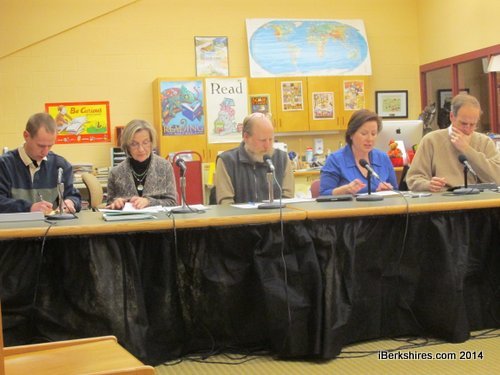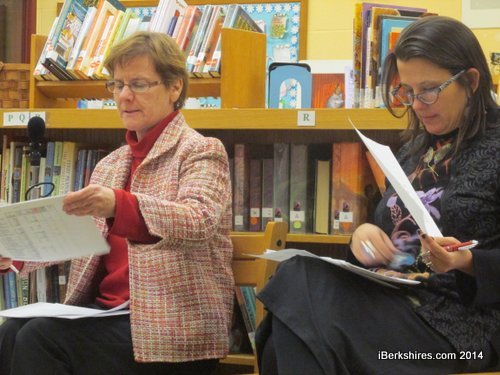Williamstown Elementary Budgets for Repairs
 The School Committee chose to budget for the some $100,000 in upgrades rather than dip into the elementary school's endowment. The School Committee chose to budget for the some $100,000 in upgrades rather than dip into the elementary school's endowment. |
WILLIAMSTOWN, Mass. — The Williamstown Elementary School Committee on Tuesday decided to fund building upgrades out of the regular school budget and not use a building endowment established by Williams College when the school opened its doors.
Superintendent Rose Ellis told the committee it had access to about $300,000 from the endowment, but she recommended leaving it alone as a "rainy day" fund in case of extraordinary, unforeseen building repairs.
Several committee members questioned whether it made more sense to use the endowment to pay for a pair of big-ticket building upgrades and save the regular budget funds for educational programs.
Ultimately, on a vote of 4-1, the committee decided to follow Ellis' recommendation and use the regular budget.
The projects in question have a combined cost of just less than $100,000. They were identified as part of a townwide energy audit conducted under a Green Communities grant. The district projects the installation of new variable speed drives in its HVAC system at $82,372; repairs to unit ventilators on the building's hot water heater are expected to cost $15,981.
Both projects are expected to produce significant savings through increased energy efficiency, and no one on the committee questioned the wisdom of following the energy audit's recommendation.
The question was how to pay for the upgrade.
Ellis and district business director Lynn Bassett told the committee they had identified about $75,000 in potential savings in the fiscal 2014 budget that could be applied to existing line items for building maintenance to cover the upgrades.
Some members of the School Committee asked whether it would make more sense to spend money from the endowment and spend "extra" money in the budget in the classroom.
"What could we conceivably do with the $100,000 or so we're talking about?" Vice Chairman Chris Jones asked.
"This is our chance at grabbing this money," committee member Dan Caplinger said. "We can't go to the building renewal [endowment] and say, 'Will you pay for a new math teacher or reading instruction?'
"If this allows us to take money from a restricted fund rather than spending less restricted funds [on the building] ..."
Ellis and Principal Joelle Brookner noted that the potential budget savings should be spent on a one-time expenditure, not a curriculum enhancement that would need to be funded in future years.
But the committee pressed the administrators to identify a potential expenditure — like a technology upgrade — that would more directly benefit instruction.
"I'm going to put Joelle on the spot," Jones said. "If you could get your hooks into the money, what would you do with it? This is your big chance."
Brookner said there are technological needs, for example, but they are being addressed through the regular budget process. They could be accelerated by shifting money from the endowment to do the building upgrades, but she took a big-picture view.
"The building renewal fund, going forward, will hopefully keep the budget in tact," Brookner said. "If some giant thing happened to the building, [the $100,000 savings in the budget] is not something we'd have regularly available to us.
"I have to be reasonable about how I'm asking for things."
Ellis said she was willing to split the difference and take $50,000 from the endowment fund and $50,000 from the regular budget, but there were members of the committee who argued for leaving the endowment alone.
"The building renewal fund, in my mind, has always been intended for a bigger need than this — a crisis need," Chairwoman Valerie Hall said. "We have the funds, and we don't have ... other crisis issues."
Richard Reynolds and Caplinger each noted that leaving money in the endowment has other other advantages.
"I don't think [the technology spending] outweighs the opportunity cost of leaving the money in the fund and getting interest on it," Reynolds said.
John Skavlem, who ultimately voted against leaving the endowment alone, argued for using money earmarked for the building to address the building issues.
"I'd rather see [the budget] go more toward the benefit of students," he said.
In other business on Tuesday, the committee got its first look at the broad outlines of the district's fiscal 2015 budget.
Bassett told the committee she expects a 3.8 percent increase in the total budget, most of which will be offset by an anticipated 2.5 percent increase in town funding reported by Town Manager Peter Fohlin at Monday's Selectmen's meeting.
Much of the school's rise in expenditures is being driven by increased health insurance costs. After two years of no increase in the cost to the district, administrators are expecting a 9.5 percent hike this year.
The district's school bus contract with Dufour Inc., which the committee approved on Tuesday, carries a 3 percent increase in FY15.
The committee on Tuesday also approved increased tuition for out-of-state students and the school's pre-kindergarten program on the order of 3.5 percent, and it looked at school choice recommendations for the 2014-15 school year.
Ellis recommended making 13 new choice slots available from grades K-6, but the committee suggested the district cut two new choice slots from that list: in the school's already large class of rising third-graders.
Ellis' draft recommendations included two new choice slots in next year's third grade, which would create a potential class size of 69, spread over four sections. Normally, WES has three-section classes, but the "bubble" in the current second grade has kept it split into four classrooms.
The committee noted that at some point the school will want to break that class into three sections, so it makes no sense to create choice slots now.
Ellis will bring new recommendations back to the committee for a vote at its March 12 meeting.
Also at the March meeting, the committee will get its first look at the proposed 2014-15 school calendar. Under cajoling from Hall, who already is getting calls from families looking to plan vacations, Ellis reported it looks like the school may be proposing a Sept. 3 start day, a June 19, 2015, end of school and and a two-week December break, taking Monday and Tuesday, Dec. 22 and 23, off.
Tags: fiscal 2015, school building, WES,



 WILLIAMSTOWN, Mass. — The Prudential Committee on Wednesday signed off on more than $1 million in cost cutting measures for the planned Main Street fire station.
WILLIAMSTOWN, Mass. — The Prudential Committee on Wednesday signed off on more than $1 million in cost cutting measures for the planned Main Street fire station.













